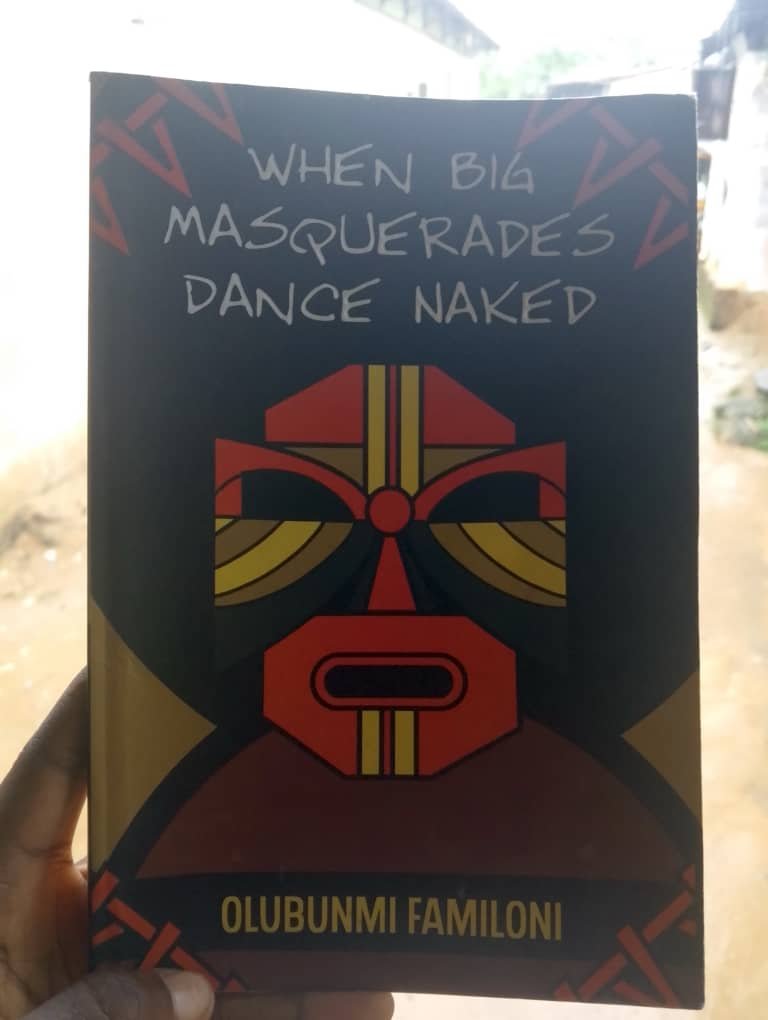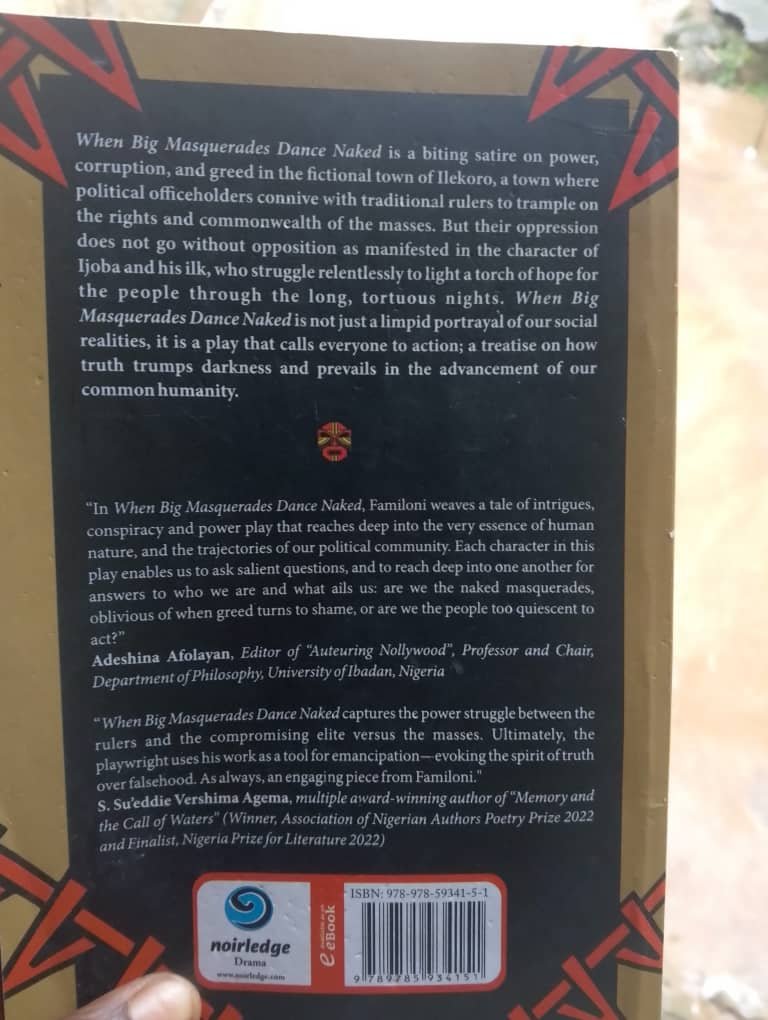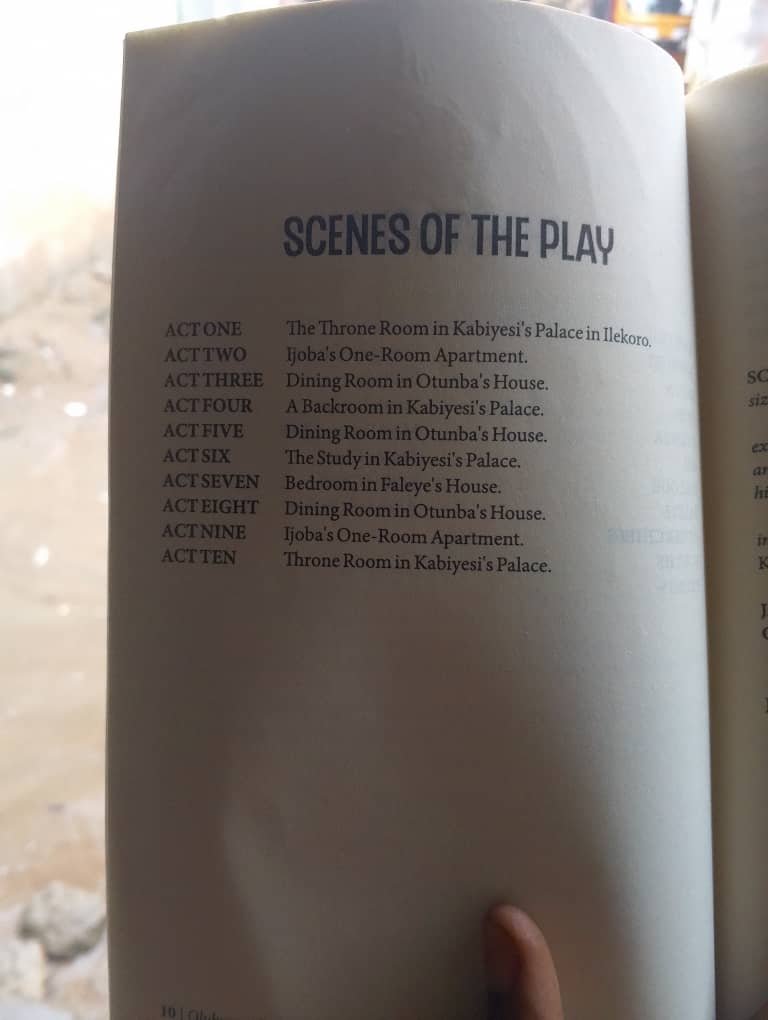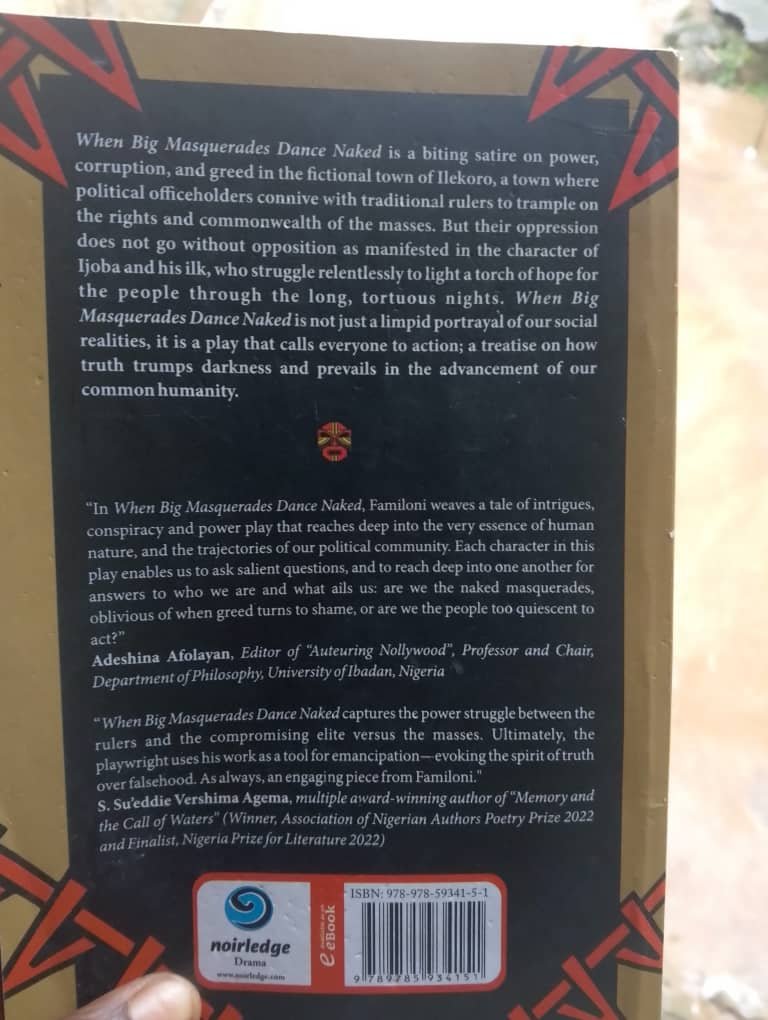(Eng/Esp) Cuando los grandes mascarados bailan desnudos/ When Big Masquerades Dance Naked.
When Big Masquerades Dance Naked by Olubunmi Familoni
I didn’t expect much when I randomly picked up the book When Big Masquerades Dance Naked during a weekend visit to my friend who studies English at the University of Uyo. We were just chilling on a hot Saturday afternoon when he handed it to me and said, “You should check this one out. It’s part of our reading list this semester.” Out of boredom and curiosity, I opened the first page. I didn’t know I was about to step into one of the most satirical and reflective works I’ve come across in Nigerian literature.
Olubunmi Familoni, the author, didn’t come to joke with this one. The play is short but loaded. From the very beginning, you can feel that there’s a strong message buried beneath the humor, the drama, and the political tension. It’s set in a town called Ilekoro, which, though fictional, feels very much like many real places in Nigeria where political power is abused and traditional institutions are manipulated to serve selfish interests.
The story follows Ijoba, a passionate youth activist who refuses to keep quiet in the face of injustice. In a society where silence is often the safest option, Ijoba’s boldness becomes both admirable and dangerous. He challenges the toxic bond between politicians and traditional rulers who dance around in the disguise of serving the people while, in truth, they serve only themselves. What makes the drama more biting is how it mixes deep truths with sharp humor and irony. You find yourself laughing at one point and then nodding your head in deep agreement the next.
Reading the play, I couldn’t help but think of our own country and the things we see every day. The drama may be set in a fictional town, but the reality it reflects is very close to home. We’ve seen how traditional thrones have been politicized, how community leaders shake hands with corrupt politicians behind closed doors while pretending to protect the people’s interest. Familoni doesn’t just show us these issues, he mocks them in a way that stings.
The title of the book itself is loud and daring—When Big Masquerades Dance Naked. In many African cultures, masquerades represent sacredness, mystery, power, and tradition. So when a big masquerade dances naked, something has gone terribly wrong. It’s a metaphor that hits deep. It speaks of shame, exposure, and the collapse of dignity in institutions that were once highly respected. That image alone sets the tone for the boldness of the play.
One thing I appreciated about the book is how natural the dialogue flows. It doesn’t feel forced or overly polished. The characters speak like real people, and you can feel the tension and frustration in their words. It’s not just political commentary—it’s a mirror that reflects who we have become as a people. You feel the betrayal, the disappointment, and the burning desire for change.
I was also drawn to the way Familoni uses satire. It’s not every day you find a writer who can blend bitter truths with such humor without losing the seriousness of the message. There were scenes that made me laugh, but behind that laughter was pain. The pain of knowing that what was being said as fiction is actually a reflection of reality.
Ijoba’s role reminds us of the courage it takes to speak truth to power. It’s easy to criticize from a distance, but when you are on the front line, the cost can be heavy. The way other characters try to silence him, discredit him, or lure him to join the system shows how power structures operate to protect themselves. But his refusal to back down is a message to every young person who still believes in integrity.
The beauty of the play is that it doesn’t end with clear resolution, and that’s intentional. It leaves the reader thinking. What happens when the masquerades are exposed? Do they dance back into hiding or do the people finally see through their tricks and demand real change? That open-endedness forces you to reflect on your own role in the society. Are you part of the problem or the solution?
As someone who doesn’t study English or Theatre Arts, I didn’t expect to be this moved by a play. But I’m glad I read it. It reminded me that literature is not just for classroom analysis. It can awaken us, challenge us, and push us to think differently about the world we live in.
I strongly recommend this book not just to students but to anyone who is tired of how things are in Nigeria and wants to understand the deeper games being played. It’s a bold, clever, and thought-provoking work that deserves more attention than it’s currently getting. Familoni has used the stage as a platform to confront our fears and failures in leadership, and he does so with courage and clarity.




Nunca imaginé que terminaría tan atrapado en una obra de teatro, y mucho menos en una que encontré por casualidad. Fue un sábado cualquiera, cuando visité a un amigo que estudia Inglés en la Universidad de Uyo. Estábamos charlando tranquilamente en su cuarto cuando me pasó el libro y me dijo: “Lee esto, está en nuestro plan de lectura del semestre.” Sin pensarlo mucho, abrí la primera página, y ahí comenzó un viaje que no esperaba. Lo que pensé que sería una lectura aburrida de fin de semana resultó ser una pieza poderosa, profunda y muy realista.
When Big Masquerades Dance Naked es una obra breve, pero con una fuerza impresionante. Desde las primeras páginas se siente que el autor, Olubunmi Familoni, no vino a jugar. Su estilo es directo, irónico, con un humor que raspa y una crítica social que no se disfraza. El pueblo donde ocurre la historia, Ilekoro, puede ser ficticio, pero se parece demasiado a muchos lugares reales de Nigeria donde los líderes tradicionales y políticos caminan juntos para explotar a los más débiles.
El personaje principal es Ijoba, un joven activista con fuego en el pecho. En una sociedad donde lo normal es callar, él decide hablar. Va contra el sistema, critica la corrupción, expone los pactos sucios entre políticos y jefes tradicionales, y lo hace sin miedo. Pero también sufre por ello. Lo quieren silenciar, desacreditar, comprar. El poder, como siempre, quiere protegerse. La forma en que la obra desarrolla estos conflictos es tan real que uno se siente dentro de la historia.
El título es una joya en sí: When Big Masquerades Dance Naked. En nuestras culturas africanas, los mascarados representan respeto, misterio y poder. Son figuras sagradas. Así que cuando un gran mascarado baila desnudo, es un desastre. La imagen es fuerte y simbólica. Representa la vergüenza, la pérdida de valor y la exposición de quienes se suponía que eran intocables. Es una forma muy inteligente de hablar sobre lo que está pasando en nuestras comunidades.
Lo que más me gustó fue el lenguaje. No es rebuscado ni artificial. Los personajes hablan como la gente común. Puedes sentir su dolor, su rabia, su miedo. La obra no intenta impresionar con palabras grandes, sino con verdades crudas. Y eso la hace poderosa. La sátira que usa Familoni es brillante. Te ríes, sí, pero después te das cuenta de que te estás riendo de una realidad que duele. Porque lo que se critica en la obra no es ficción para nosotros. Es nuestra vida diaria.
Ijoba representa esa voz que todos llevamos dentro, esa que quiere justicia, que sueña con un país mejor. Pero también nos recuerda que decir la verdad tiene un precio. No es fácil ir contra el sistema. Muchos prefieren adaptarse, quedarse callados o incluso beneficiarse de la corrupción. Pero él elige otro camino. Y aunque no sabemos si gana o pierde al final, lo importante es que no se rindió.
Lo interesante es que la obra no da una conclusión cerrada. No dice “esto es lo que pasará”. Te deja pensando. ¿Qué haremos nosotros cuando los grandes mascarados queden expuestos? ¿Seguiremos aplaudiéndolos o los sacaremos del escenario? Ese final abierto es lo que hace que la obra quede en tu mente mucho después de leerla.
Algo que me sorprendió fue cuánto conecté con esta obra sin ser estudiante de literatura. No soy de los que leen teatro por gusto, pero esta experiencia me cambió. Me hizo ver que el arte, cuando se hace con sinceridad, puede abrir los ojos, puede tocar el alma. Familoni no escribe para entretener, escribe para despertar. Y lo logra.
Recomiendo esta obra a todos los que estén cansados del silencio, de la injusticia, de ver cómo los poderosos se burlan del pueblo. Es una lectura corta, pero intensa. Es el tipo de libro que te hace pensar, que te sacude. Y lo hace sin ser complicado ni distante. Es claro, nigeriano, actual, y muy necesario.
Al terminar el libro, me quedé en silencio por un rato. Pensando. Recordando noticias, experiencias, conversaciones. Me di cuenta de que todos hemos visto a esos “mascarados” bailando sin vergüenza frente a nosotros. Y quizás ya es hora de dejar de mirar y empezar a hablar, como Ijoba.
You received an upvote ecency
Well, I wasn't familiar with this book at all, but the way you describe it left me with a tremendous desire to read it. Your review completely captivated me. The title alone, "When Big Masquerades Dance Naked," is incredibly powerful; it immediately tells you there's something powerful inside. And I love the idea that it's a satire, that it blends humor with such direct criticism. I think those are the stories that stick with you the most. I'll make a note of it right now. Thanks for introducing me to this gem!